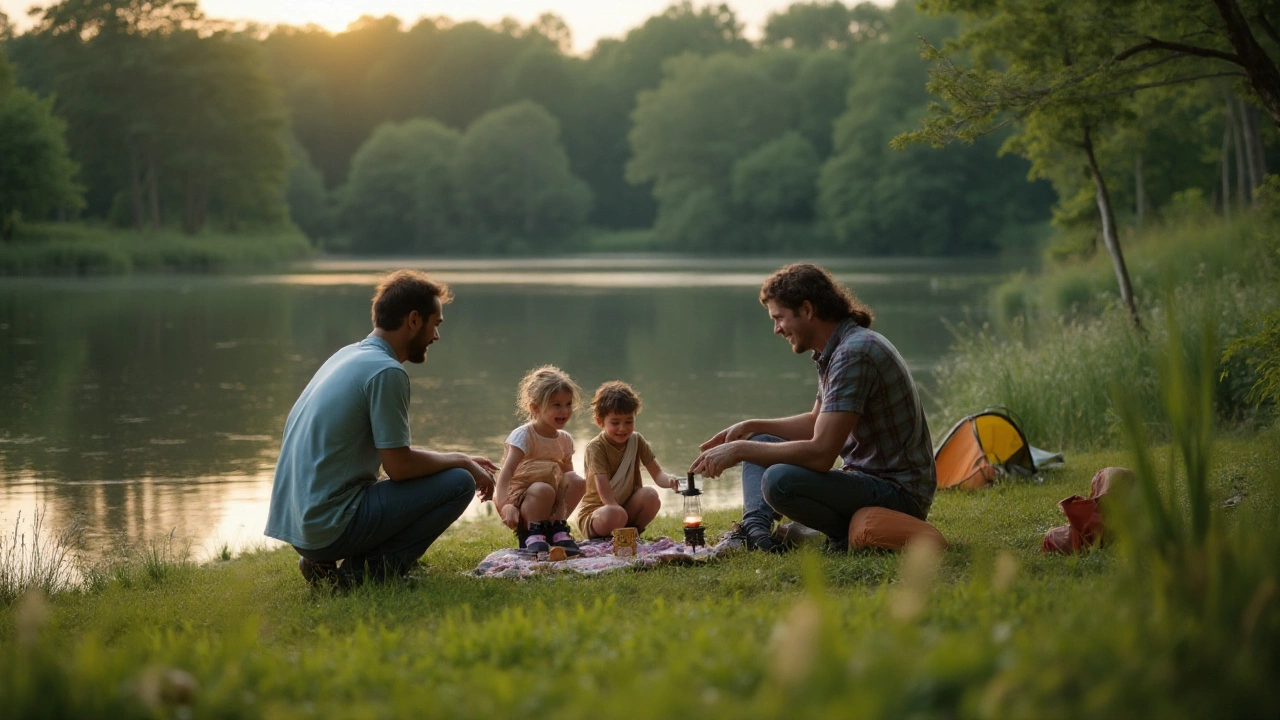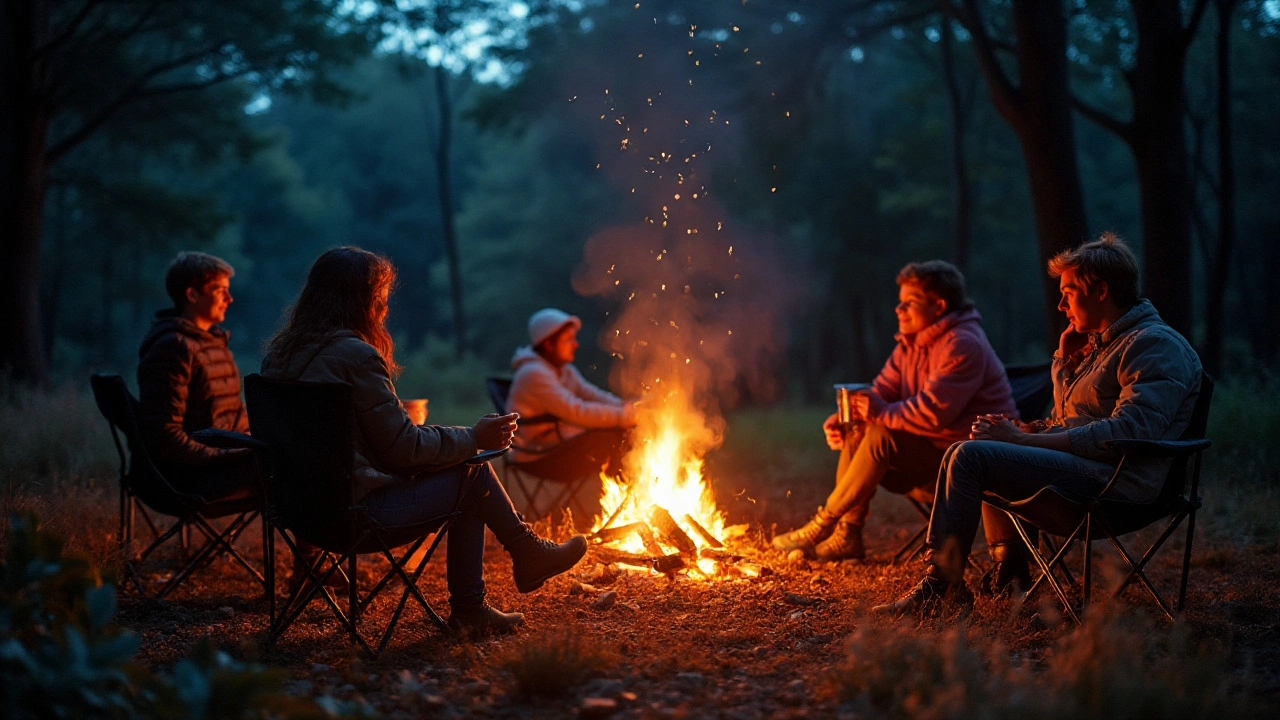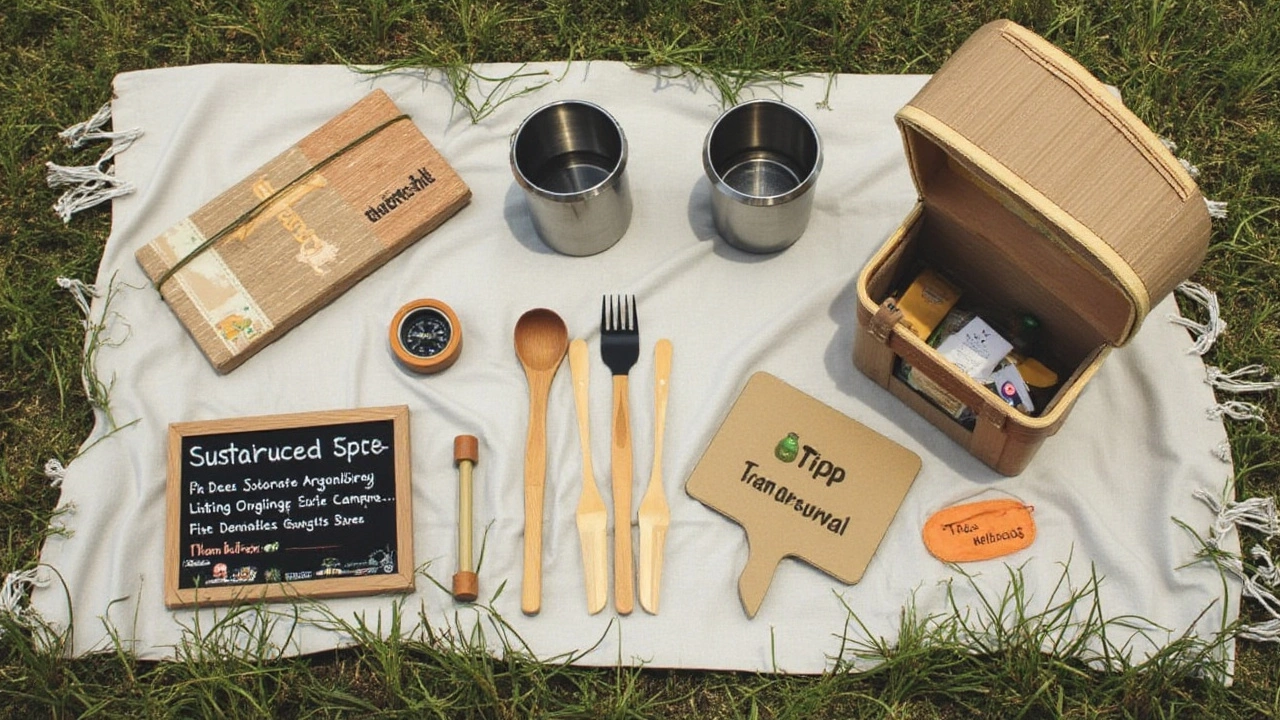The Golden Rule of Eco-Friendly Camping: Sustainable Tips and Practices

There's something infinitely romantic about the idea of camping—sleeping under the stars, waking up to the soft chirping of birds, and breathing in the crisp air of untouched nature. But, as we set off on our outdoor adventures, it’s crucial to remember the importance of leaving nature as pristine as we found it. This concern for the environment brings forth what's known as the 'Golden Rule' of camping.
Imagine if each camper embraced this thoughtful rule, respecting and conserving the natural beauty that gracefully surrounds them. Not only does this practice safeguard our precious earth, but it also ensures that future generations can experience the wonders of nature in all its glory.
Join us as we explore sustainable camping techniques, practical tips, and innovative ideas to transform your next camping trip into an eco-friendly escapade. From eco-friendly gear to understanding Leave No Trace principles, we'll delve into ways that elevate your camping adventures while honoring the planet.
- Understanding the Golden Rule
- Eco-Friendly Camping Essentials
- Leave No Trace Principles
- Innovative Green Camping Practices
Understanding the Golden Rule
The 'Golden Rule' of camping hinges on a simple, yet profound ethos: tread lightly and leave no lasting mark on the environment. This principle is rooted in a deep reverence for nature and emphasizes the importance of minimizing human impact. As campers, the joy of experiencing wild beauty comes with the responsibility to conserve it. This rule isn't just about rules to follow; it's about cultivating an attitude that respects and values every creature, tree, and stream we encounter.
Adopting the golden rule means making conscious decisions throughout your camping journey. From the gear you choose to the paths you trek, each choice plays a pivotal role. Opting for eco-friendly camping equipment, such as solar-powered lanterns and biodegradable utensils, supports this mindset. The materials you use and transportation choices can impact not only the environment but also the quality of your camping experience. A respectful approach yields richer experiences where nature's tranquility can be more deeply appreciated.
Pioneering naturalist John Muir once said, "In every walk with nature, one receives far more than he seeks." This perspective underscores the rich rewards of respecting our natural surroundings.
Another facet of the golden rule involves adhering to the esteemed 'Leave No Trace' principles. These guidelines, established by experts dedicated to nature conservation, serve as an invaluable resource for responsible outdoor enthusiasts. Their goal is to ensure that each campsite remains not merely clean but unchanged by human presence. By following these practices, such as disposing of waste properly and respecting wildlife, campers foster a communal ethos of care and awareness. This is crucial to the sustainability of our cherished natural spaces.
A fascinating insight into human-nature interactions is reflected in visitor data from various national parks. According to recent studies, parks that emphasize educational programs on sustainable practices report higher visitor compliance with conservation rules. This highlights the role of knowledge and awareness in fostering a culture of respect and accountability. As such, the 'Golden Rule' of camping becomes a shared narrative, integral to the preservation of our planet's wild spaces for future generations.

Eco-Friendly Camping Essentials
Embarking on a camping adventure with a commitment to sustainability often starts with the kind of gear you choose. Eco-friendly gear not only respects the environment but enhances your experience by blending seamlessly with nature. Look for camping gear made from recycled materials or sustainably sourced resources. Innovative companies have developed biodegradable tent stakes, solar-powered lanterns, and even backpacks crafted from recycled plastic bottles. Such choices significantly reduce the carbon footprint of your adventure.
One of the most significant contributions to eco-friendly camping is energy management. Using solar-powered equipment such as chargers for your devices ensures you harness renewable energy, lessening your impact on the environment. It's heartening to find portable solar panels lightweight enough to carry along, allowing you to power essential gadgets sustainably. Never underestimate the energy efficiency of LED lights for your campsite, which provide ample illumination without draining resources. Choosing rechargeable batteries instead of single-use ones also aligns with this cause.
Camp cuisine is another area where eco-friendly practices shine. Cookware manufactured from recycled aluminum or stainless steel, both durable and environmentally friendly, is a wise choice. For those planning meals, kitchenware that is compact and efficient can help maintain balance with nature. Opting for reusable cutlery and dishes cuts down on waste drastically—always aim for zero waste by using cloth napkins and bags instead of disposable options. This seemingly small change collectively has an impressive environmental impact.
Cooking with a Green Mindset
When it comes to cooking, campfires—though romantic and traditional—might not always be the most eco-conscious choice. Consider using portable stoves, which can significantly minimize fuel usage and pollution. BioLite is a brand offering stoves that convert the heat from burning biomass into electricity, providing an eco-friendly option for campsite cooking. Imagine enjoying a sumptuous meal without leaving behind any trace of soot or burnt wood! This innovative approach effortlessly aligns with sustainable travel methods.
Water and Waste Management
Water conservation is another critical aspect of an eco-friendly camping trip. When selecting a campsite, ensure it encourages sustainable water practices such as access to refill stations or streams. Carry a reusable water filter for purifying natural water sources instead of relying on bottled water. Proper waste disposal mechanisms are also essential. It's crucial to pack out all your waste, leaving nothing behind that could harm local wildlife or ecosystem health. Composting toilets or small, portable waste-disposal systems have become popular, as they minimize the impact of human waste on the environment.
As Shannon Stowell, the CEO of the Adventure Travel Trade Association, eloquently puts it,
"Adventure travel, at its core, is about connection to nature. We achieve this most fully by protecting, preserving, and enhancing those wild places that offer such experiences."This poignant reminder encourages us to choose wisely and embrace these green camping essentials not just for ourselves but for the planet we cherish. By doing so, each camping trip becomes a meaningful step towards conserving the delicate beauty of nature.

Leave No Trace Principles
Venturing into the great outdoors carries a delightful sense of exploration. But with this adventure comes a solemn responsibility: the duty to tread lightly and preserve the environment that captivates us. The Leave No Trace principles offer a simple framework to guide outdoor enthusiasts towards maximizing their enjoyment while minimizing their ecological footprint. These principles are not only about practice but about cultivating a profound respect for nature. Ensuring that others, too, can bask in the beauty of unmarred wilderness becomes our collective mission.
Adhering to the Leave No Trace ethos commences with planning ahead. Anticipating your needs for sustenance and shelter while factoring in weather and terrain prevents unnecessary disturbances. It allows campers to minimize waste and lessen their impact on local flora and fauna. Packing reusable containers not only reduces trash but also bolsters an eco-friendly camping routine. Also, knowing the rules of the specific area you are visiting prevents accidental infractions, like hiking prohibited trails or disturbing protected wildlife.
As Henry David Thoreau rightly said, “What is the use of a house if you haven't got a tolerable planet to put it on?”
During the excursion, your mind should always linger on the principle of campfire safety. Opting for a lightweight stove over an open fire isn’t just practical—it's a mindful stride toward sustainable travel. Stoves leave no trace, avert the scarring of fire rings, and offer a more controlled way of cooking. If a fire is essential, be sure to use existing rings to avoid impacting new ground. Human waste, a less glamorous subject, unfortunately, is a part of the natural caring duty. Digging small 'cat holes' is a discreet method to handle it and ensure separation from water sources, which preserves the purity of rivers and lakes.
Protecting Wildlife
Interacting with wildlife is often one of the most memorable aspects of camping. However, those encounters should remain respectful. Feeding animals, however tempting, disrupts their natural instincts and can lead to dependency. Observe from a distance for safety—not just yours, but also theirs. Additionally, maintaining food storage cleanliness prevents animals from rummaging through tents and camps, which keeps both you and the wildlife safe.
Finally, leaving a site as you found it—or better—is the crown jewel of these principles. Before departing, inspect your campsite and surroundings for any forgotten equipment or trash. Picking up even what wasn’t yours, embodies the heart of the green camping mantra. Remember, the joy we derive from nature is vastly connected to its health and purity, much like how our roots tether us to the earth. By following Leave No Trace principles, we ensure that this connection remains unbroken and available for generations to come.

Innovative Green Camping Practices
Embarking on an eco-friendly camping adventure involves a careful balance between embracing the charm of the wild and adhering to practices that guard the environment. With the surge of awareness in sustainable travel, a plethora of innovative solutions has emerged, making it easier for campers to minimize their ecological footprint. One simple yet effective strategy is setting up a solar-powered camp. Solar panels have shrunk in size and cost, making them accessible for campers who wish to power their devices without relying on harmful fossil fuels. Imagine the joy of charging your lantern or phone with clean energy as the sun sets behind the mountains, leaving you connected yet serenely detached from the chaotic buzz of urban life.
Cooking is another area where sustainable practices can shine. Portable solar cookers and biomass stoves are rising stars in the world of green camping. These devices harness the natural energy of the sun or burn twigs and leaves efficiently to cook meals. Not only do they reduce the need for disposable fuel canisters, but they also add an adventurous twist to outdoor cooking. The idea of preparing a meal with the simple heat from the sun stirs a primal satisfaction and invites creativity into your camp cuisine. As a bonus, these stoves are usually lightweight, easily assembled, and don't emit harmful gases.
Water conservation and purification present another frontier for innovative solutions. Products like microfiber travel towels, biodegradable soaps, and portable water filters can make a huge difference in preserving water sources. Microfiber towels dry quickly and require less washing, therefore conserving water. Biodegradable soaps prevent the leaching of chemicals into natural water bodies, protecting aquatic life. Portable water filters or purification tablets ensure that you’re hydrating without relying on single-use plastic bottles. These approaches collectively create a systemic ripple effect that preserves the beauty of natural landscapes for future explorers.
Waste management in camping scenarios has evolved dramatically with innovative ideas aimed at reducing waste. Many sustainable travel initiatives encourage campers to pack reusable containers and utensils, drastically cutting down on plastic waste. Compostable bags and portable waste kits facilitate the process of packing out your trash, leaving the campsite spotless. According to a survey conducted by REI in 2022, campers who bring reusable items can reduce their waste by up to 50%, which is a significant contribution to lowering the impact of camping activities on the environment.
"The true meaning of life is to plant trees, under whose shade you do not expect to sit." – Nelson Hendersonembracing these inventive methods can ripple beyond personal satisfaction; they contribute to a legacy of environmental stewardship. These practices form the stepping stones towards sustainable habits that ensure the continued existence of our beloved camping destinations. These small yet impactful changes underscore the importance of integrating innovative, environmentally-friendly techniques into the camping culture.